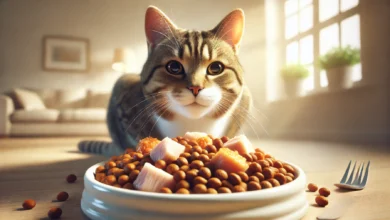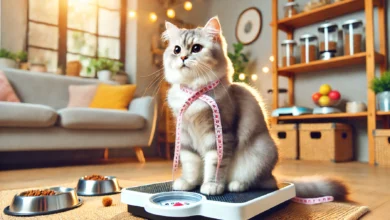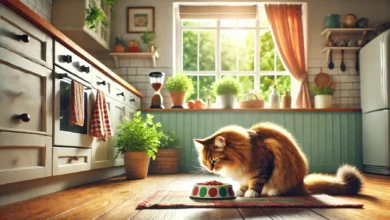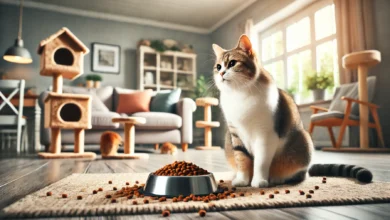Understanding Specialty Diets for Cats
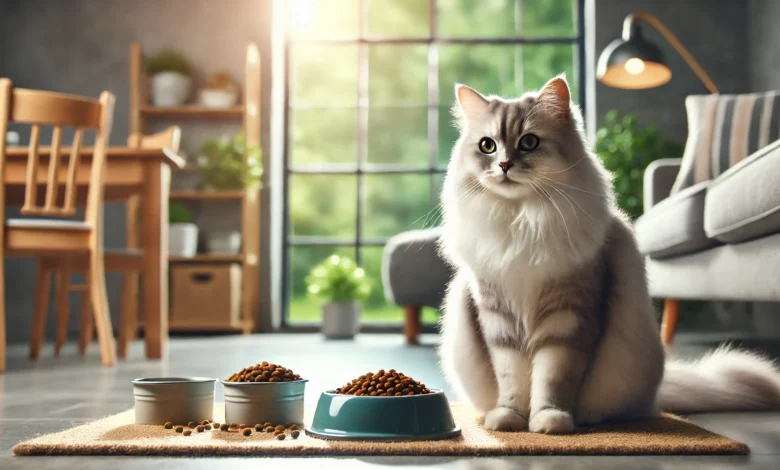
On the note of wellbeing and prosperity for your catlike pet, there isn’t anything more significant than their eating routine, especially when considering specialty diets for cats.
While customary feline food might turn out only great for the typical feline, a few felines have specific dietary necessities in light of wellbeing-related issues or explicit wholesome requirements.
This is where specialty diets for cats play a critical role.
For this, there are specialty diets designed specifically for felines.
Be it weight management diets, supporting kidney capability, or managing sensitivities, specialty diets are intended to meet explicit wellbeing needs.
In this article, we will dive profound into the universe of specialty diets for cats.
We will figure out how such eating regimens will allow your feline to carry on with a better and more joyful life.
Table of Contents
Introduction to Specialty Diets for Cats
While specialty diets for cats may seem like a craze, in truth, they are essential if one desires to maintain optimal health in felines with unique dietary needs.
These weight control plans are especially formulated to cope with conditions like stoutness, kidney infection, diabetes, and food sensitivities.
Specialty diets are designed to address specific health challenges.
While standard feline food meets general dietary requirements, specialty diets for cats are fully balanced to ensure your cat receives the nutrition they need to survive and even alleviate symptoms related to their particular condition.
For instance, if your cat struggles with obesity, a weight management diet for cats might be just what is needed.
On the other hand, if your feline is diagnosed with CKD, there are specialty diets for kidney health that help support kidney function while reducing stress on this vital organ.
These eating regimens aim to deliver proper, targeted nutrition to manage and improve medical conditions.
So, why are specialty diets necessary?
The answer lies in the specific nutritional needs of felines and how certain health conditions affect those needs.
Felines are obligate carnivores — they require animal-based proteins to thrive and be healthy.
When health conditions arise, these needs change, and that’s where specialty diets for cats come in to fill the gap.
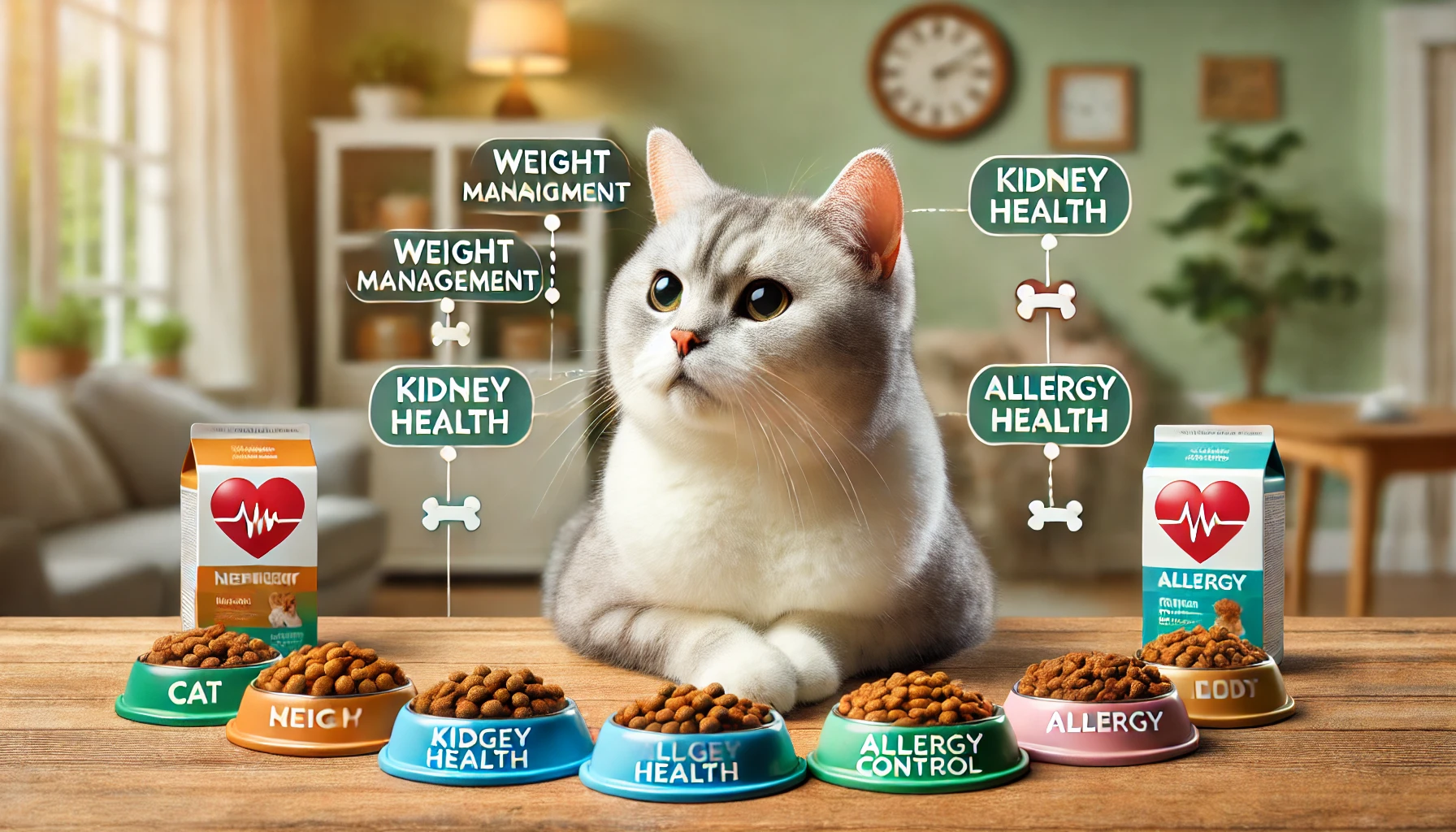
Why Cats Need Specialty Diets
As cat owners, we know that not all cats are the same.
Much like humans, they can suffer from a variety of health issues that require specific nutrition, which is where specialty diets become indispensable.
In line with this, specialty diets for cats offer tailored solutions to these specific issues, such as weight management, diabetes control, urinary health support, and food sensitivities.
- Manage long-term health conditions like kidney disease and diabetes with the help of specialty diets for cats.
- Address food allergies and sensitivities to specific proteins through allergy-friendly diets for cats.
- It also accommodates weight reduction in overweight felines via specific weight management diets that are calorie-controlled.
- Improve urinary health in felines prone to urinary issues through urinary health diets for cats.
These weight control plans are significant because they are formulated to contain specific nutrients in higher or lower amounts than usual, which are needed or missing in specific conditions in felines.
An example is the specialty diets for kidney health, which have lower protein and phosphorus levels and thus are more appropriate for cats with kidney disease.
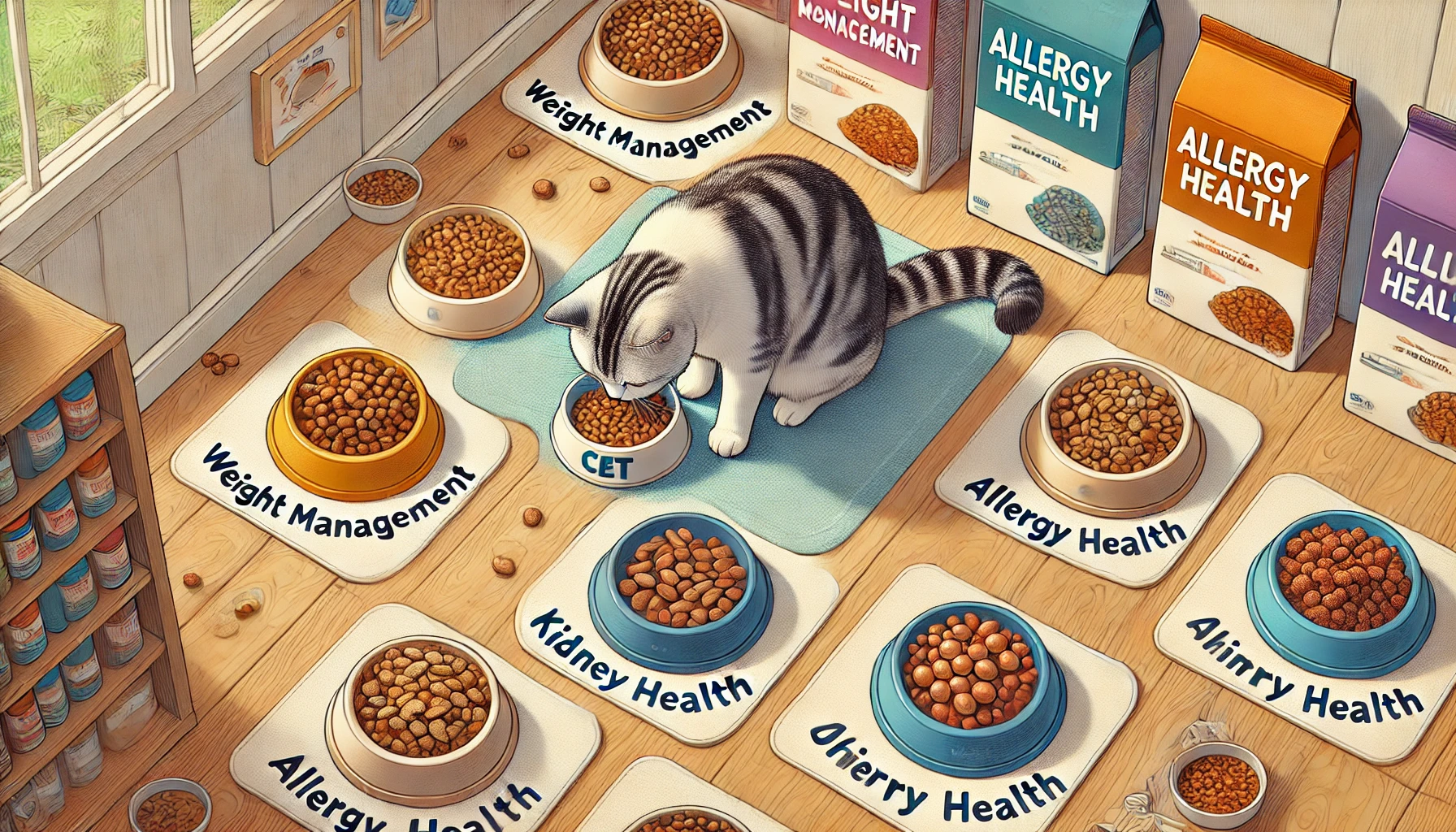
Types of Specialty Cat Diets Explained
Specialty diets can feel overwhelming with all their options available, each addressing a different aspect of your cat’s health.
The most common areas where specialty diets for cats are developed and marketed include:
Common Types of Specialty Cat Diets
- Weight control diets for cats
- Kidney health diets
- Allergy and sensitivity diets for cats
- Diabetic diets for cats
- Urinary health diets
By knowing the specific health needs of your cat, you can then select the right specialty diet to achieve overall wellness.
In the following sections, we will examine each type of specialty diet for cats in more detail and learn about how they work and which felines seem to benefit most from them.
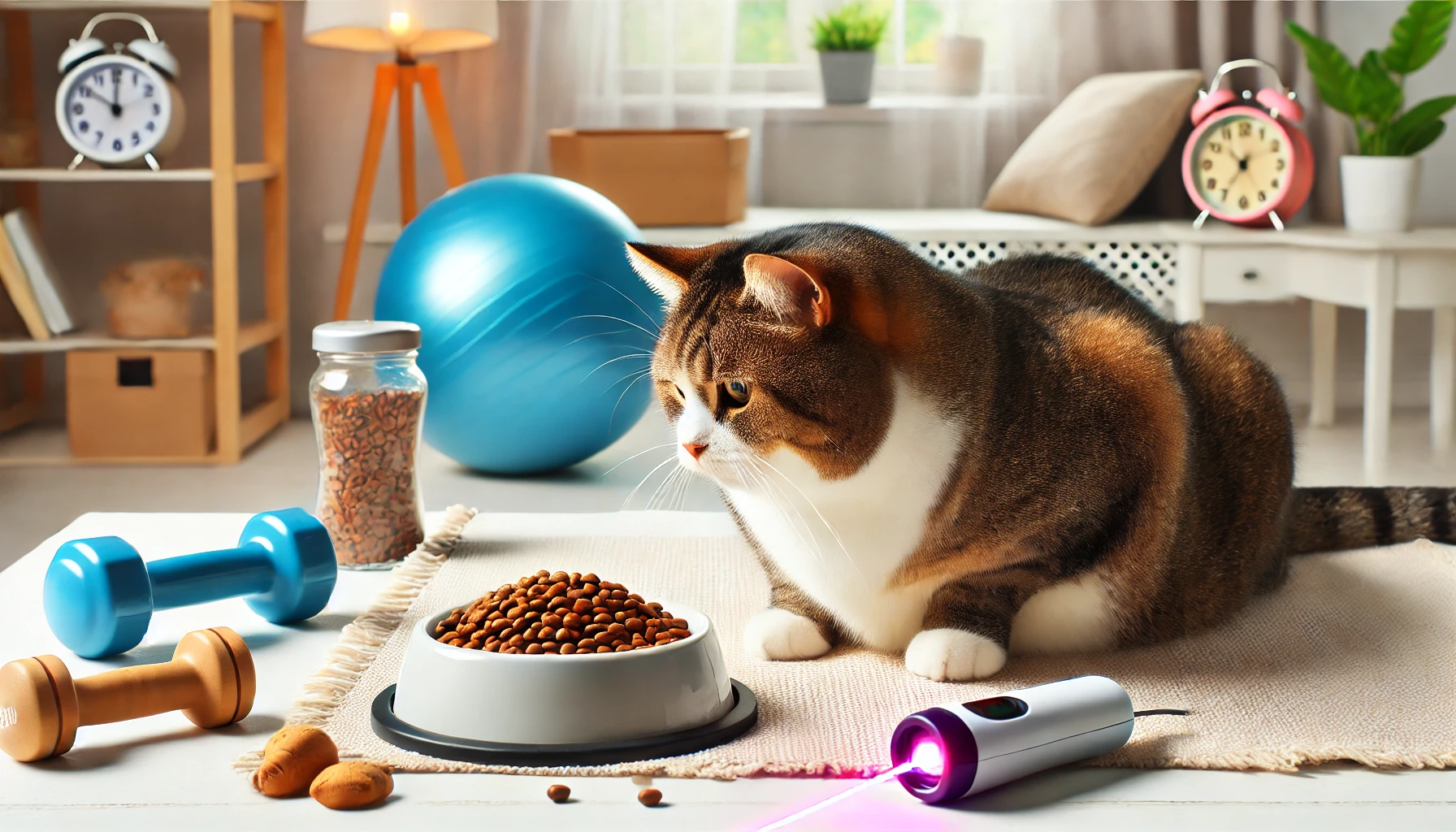
Weight Management Diets for Overweight Cats
Weight management is vital in your feline, particularly on the off chance that your catlike sidekick has placed on a couple of pounds.
Using a specialty diet for weight management can be the key to helping your cat regain a healthy weight.
Similar as people, felines can become corpulent, which will thus lead to serious medical issues like diabetes, joint inflammation, and even coronary illness.
That’s why introducing a specialty weight management diet for cats is essential.
Luckily, weight management specialty diets assist with shedding off those additional pounds and allow him to achieve a solid weight.
These specialty diets for cats are designed specifically to address weight-related health issues.
Weight reduction in felines ought to, in this manner, be slow and cautious.
Weight management diets are carefully formulated to promote gradual weight loss while ensuring that your cat receives all the necessary nutrients.
Weight decrease that happens too quickly can be extremely perilous for a feline’s wellbeing.
That’s why the dietary plans being intended for managing weight in cats are designed for slow weight reduction while ensuring that your feline gets all the necessary sustenance.
Most specialty weight management diets are formulated with fewer calories and a higher fiber content.
This assists the feline with feeling more full while consuming fewer calories.
Then again, these specialty diets for weight management provide balanced nourishment to forestall any supplement lacks.
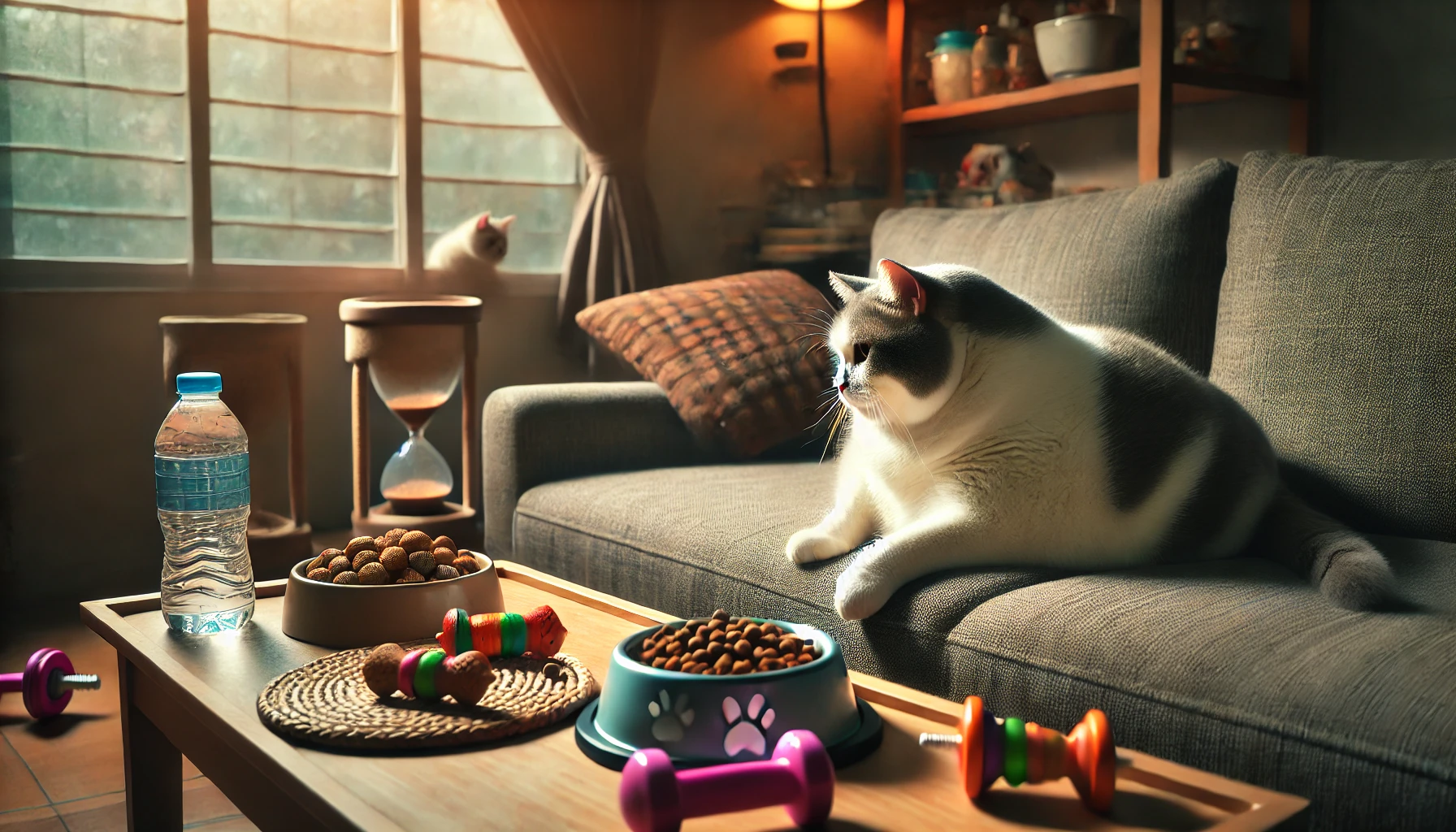
Understanding Cat Obesity Risks
On the off chance that your feline becomes excessively fat, it isn’t simply a tasteful issue; it can also become dangerous.
Overabundance weight puts unnecessary stress on your cat’s joints, increasing the gamble of developing diabetes mellitus and potentially triggering breathing issues.
A specialty diet for cats can help mitigate these risks.
Fat felines have an expanded propensity toward urinary lot emergencies and liver illnesses.
This is why addressing weight gain with a specialty weight management diet for cats is critical.
But how can you say whether your feline is overweight?
Obviously, there are sure signs one can look for in their felines.
- Ribs are hard to feel under a layer of fat.
- No apparent midsection when seen from a higher place.
- Trouble bouncing or strolling around.
- Gasping or windedness after light activity.
- Hesitance to exercise or play.
In the event that you observe any of the accompanying signs, it very well may be an ideal opportunity to put your feline on a specialty weight management diet.
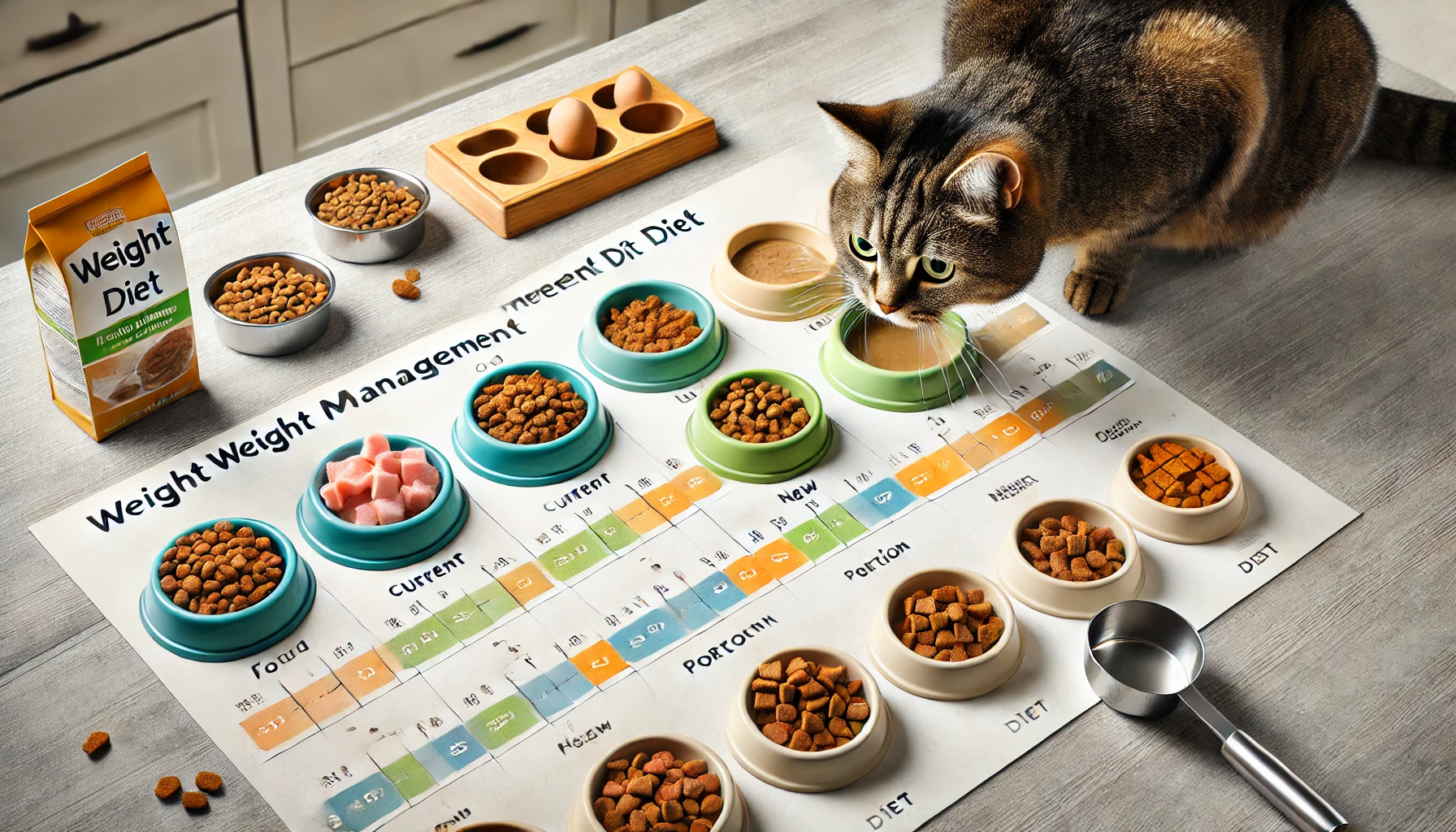
How to Implement Weight Management Diets
In the first place, on the off chance that you do realize that your feline needs to get in shape, a structured program of weight reduction should be implemented using a specialty weight management diet for cats.
Start by visiting your veterinarian to decide the ideal objective weight for your feline.
They will suggest the right specialty diet with portion sizes tailored to your feline’s necessities.
Make certain to change your feline onto a weight management diet gradually to keep away from stomach upset.
Begin by blending the new food in with their ongoing food, expanding the extent of the new eating regimen a little at a time over the course of possibly 14 days.
Other than giving your feline a specialty diet for weight loss, you likewise need to ensure he practices consistently.
You may utilize intelligent toys, food riddles, or even something as harmless as chasing a laser pointer to get him rolling around and consuming a few calories.
Specialty weight management diets are consistent, and this implies sticking to recommended feeding portions, limiting treats, and regularly weighing your feline.
By adhering to these strategies with a specialty diet, you will have allowed your catlike companion the chance for a better, more active life.
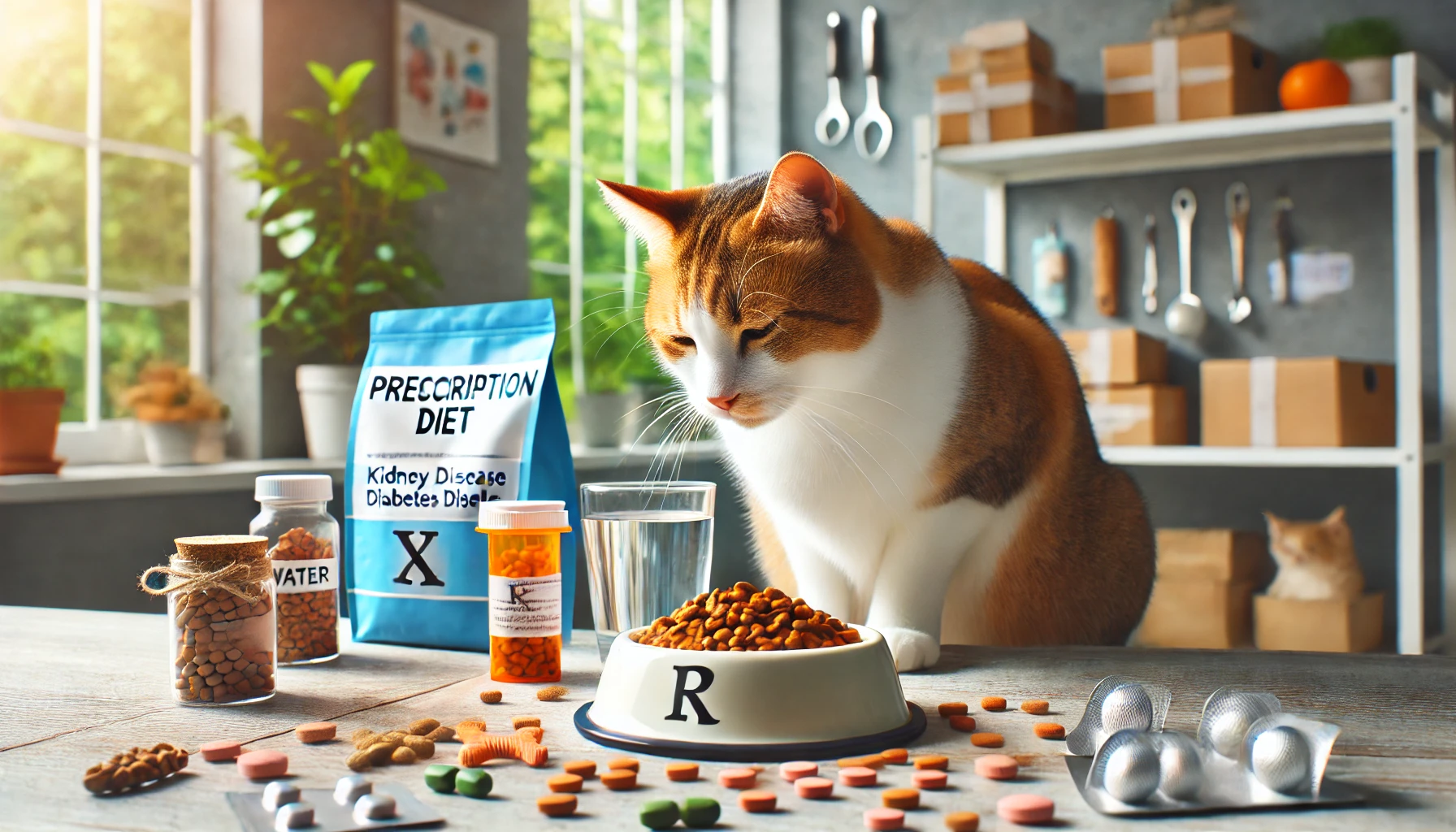
Managing Chronic Conditions with Prescription Diets
These issues range from kidney disease to diabetes and urinary tract problems — some of the most common chronic cat conditions that greatly affect their quality of life.
Fortunately, there are specialty prescription diets for cats that are formulated to assist in the management of such feline conditions.
Prescription diets for cats either alleviate symptoms or slow the progression of a disease by providing the exact nutritional profile needed to treat specific conditions.
Each instance of a chronic condition must be handled differently, and the right specialty diet for cats can greatly improve how healthy and comfortable your feline becomes.
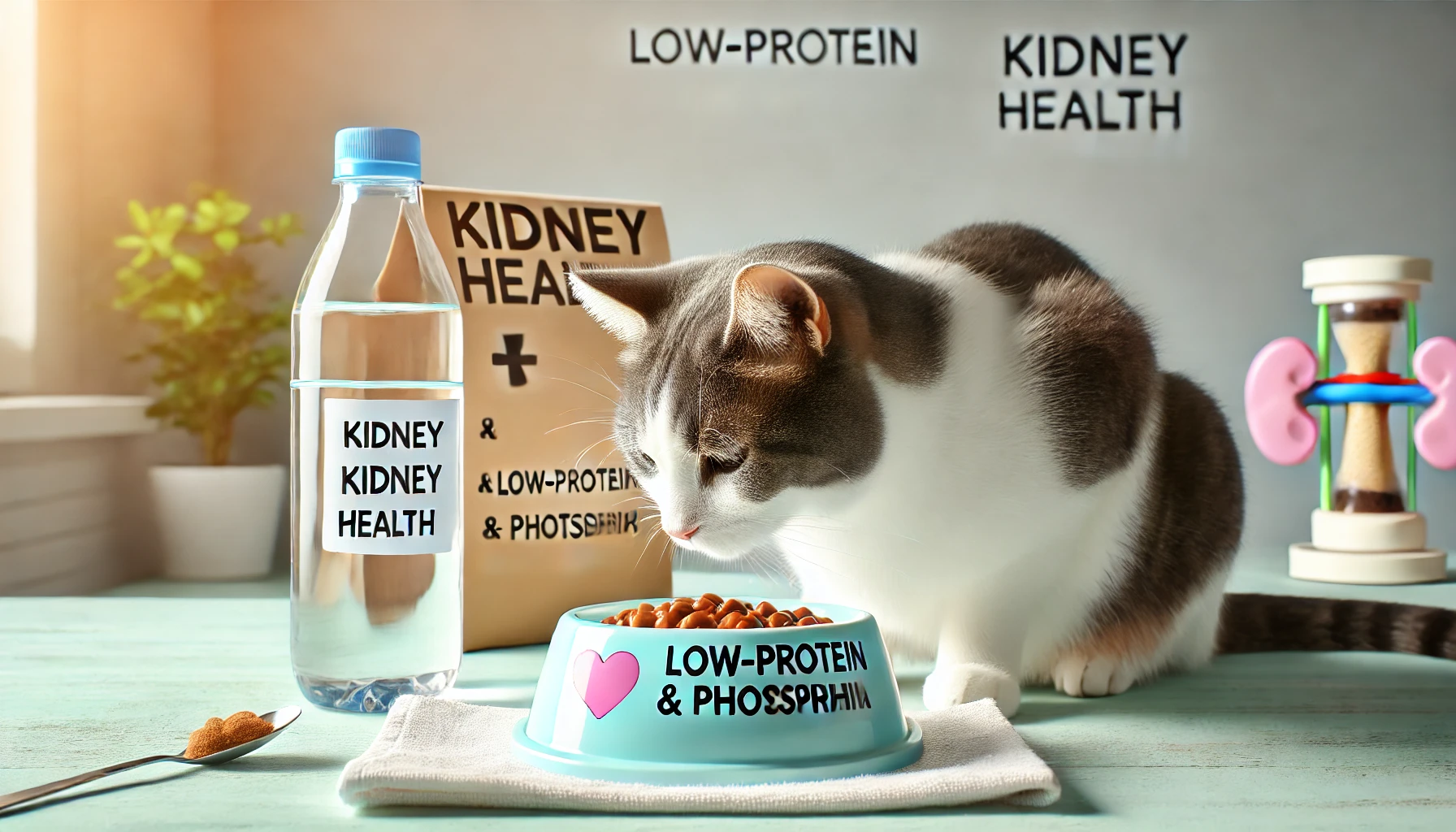
Kidney Health Diets: What to Look For
The frequency of kidney disease is fairly common in older cats, and it requires a very specific nutritional balance.
Lower protein levels, reduced phosphorus content, and higher omega-3 fatty acid levels typically characterize a specialty kidney health diet for cats, as they support kidney function while minimizing the workload of these vital organs.
If your cat has been diagnosed with chronic kidney disease (CKD), he needs a diet that manages the disease.
These kidney health diets for cats have two primary goals: to help slow the disease progression while ensuring balanced nutrition.
Look for prescription diets for kidney health that feature:
- Low protein content to reduce kidney strain.
- Reduced phosphorus levels to protect kidney health.
- Increased omega-3 fatty acids to support anti-inflammatory action.
Utilizing a specialty kidney diet in the management of CKD can make your cat more comfortable and potentially preserve an acceptable quality of life for as long as possible.
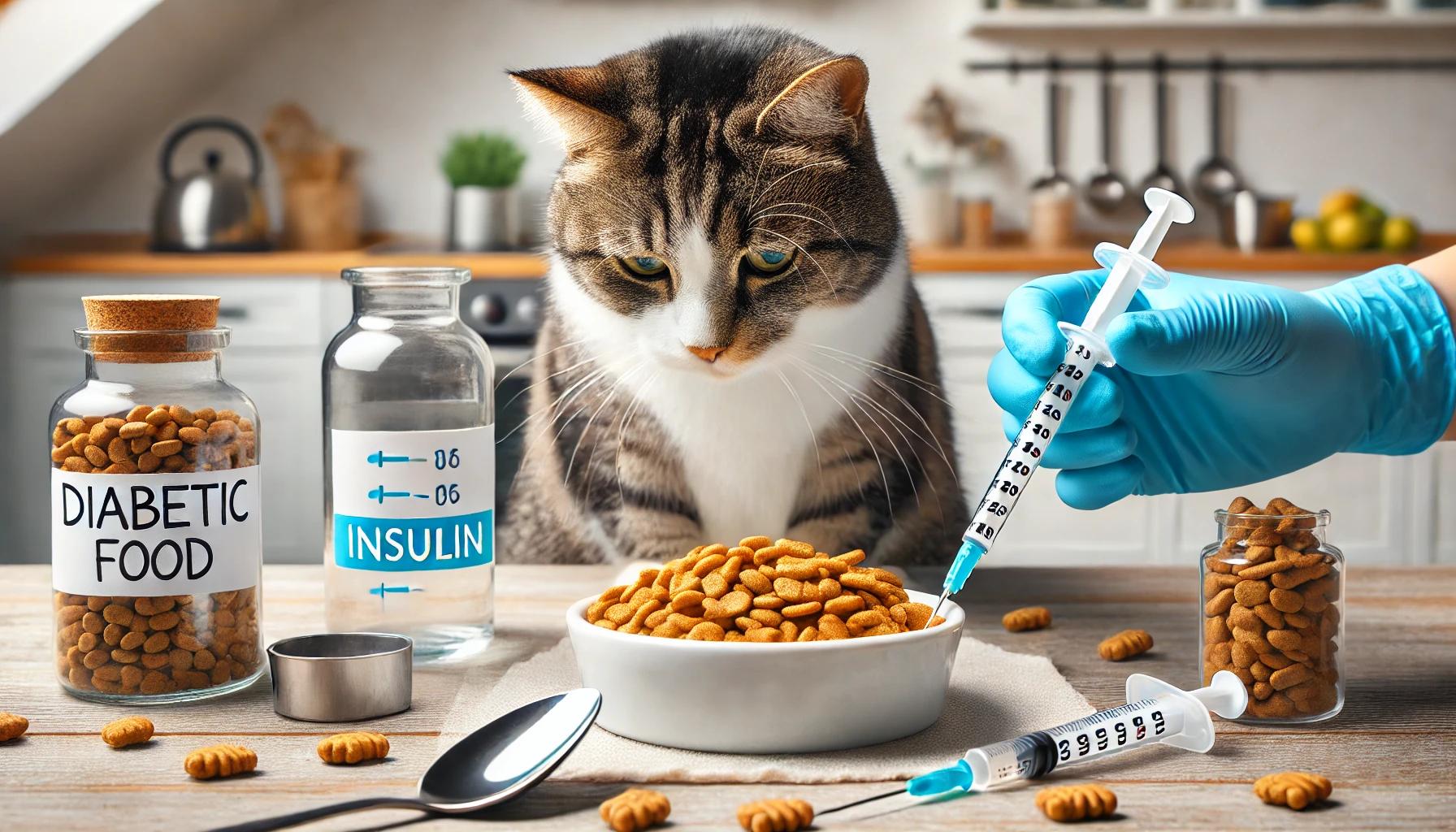
Diabetic Diets for Cats: Regulating Blood Sugar
Another chronic condition that benefits from a specialty diet for diabetic cats is diabetes.
Such diets regulate blood sugar by keeping carbohydrate intake low and ensuring high-quality protein consumption.
This balance helps maintain stable blood sugar levels with fewer spikes, which is critical for diabetic cats.
A specialty diabetic diet for cats can significantly improve the quality of life for your diabetic feline, providing better energy levels and potentially reducing the need for insulin shots.
Look for specialty diets for diabetic cats that:
Key Features of Diabetic Diets for Cats
- Low carbohydrate content to prevent spiking in blood sugar levels.
- High-quality proteins to maintain muscle mass and energy.
- Controlled fat content to support overall health.
With the right diabetic diet for cats, you can help your feline maintain more consistent blood sugar levels, reducing the complications and discomfort that arise from elevated levels, ultimately improving your cat’s overall well-being.
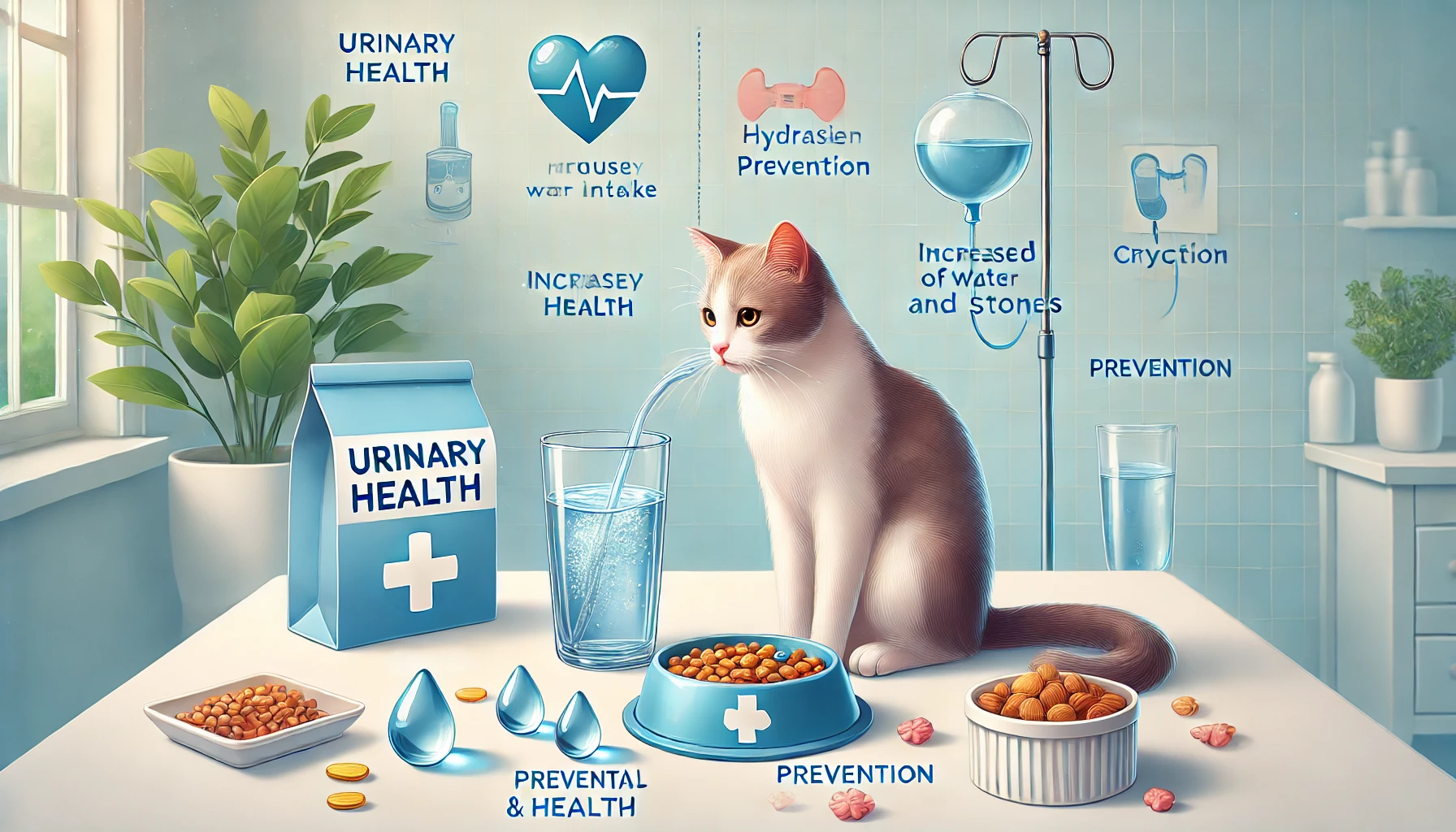
Urinary Health Diets: Preventing Crystals and Stones
Urinary tract issues, particularly those characterized by crystal or stone formation, are quite common in felines.
Specialty urinary health diets for cats help avoid these issues by controlling the levels of minerals — the same ones known to cause crystallization, like magnesium and phosphorus.
These cat urinary health diets are also formulated to increase water intake, either through feeding wet food or by encouraging your cat to drink more water.
This helps dilute the urine, reducing the risk of crystal and stone formation.
Signs that your cat may require a urinary health diet for cats include frequent urination, straining to urinate, or having blood in the urine.
Consult with your veterinarian if you notice these symptoms to discuss switching to a specialty urinary health diet that can help manage the condition.
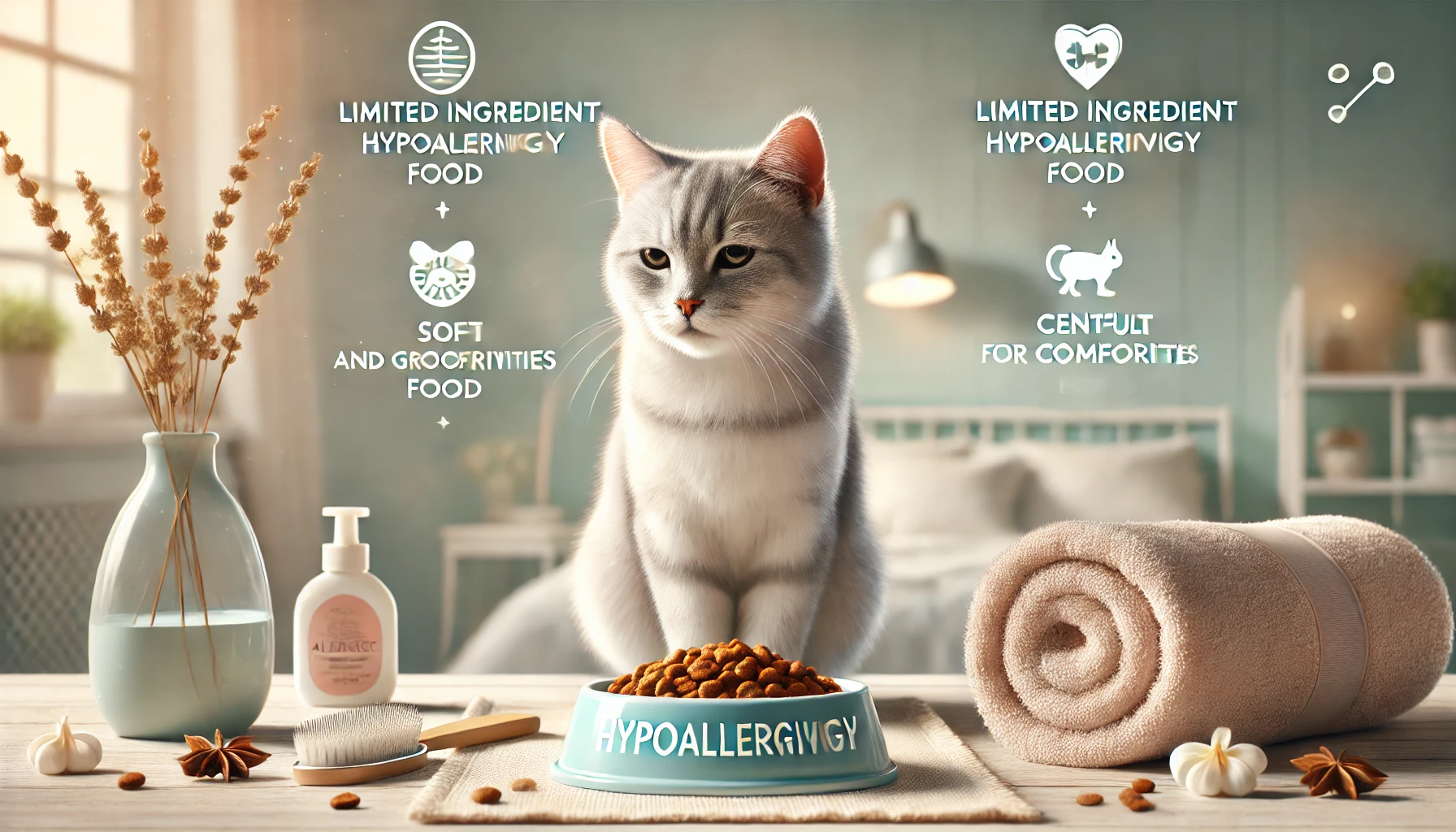
Addressing Allergies and Sensitivities in Cats
Like people, felines are just as prone to food sensitivities and intolerances.
These issues can cause them discomfort in the form of skin problems, digestive issues, or even respiratory challenges.
If your cat is showing these symptoms, it might be time to consider a specialty diet for cats with allergies.
Specialty diets for allergic cats are formulated with limited ingredients to reduce the potential for an allergic reaction to the food.
Certain proteins or additives in cat foods can trigger allergies.
Typically, these are common allergens, such as beef, dairy products, fish, or grains.
The specialty allergy diet for cats replaces these common allergens with novel proteins like venison, duck, or rabbit, paired with limited ingredients to ensure your cat’s diet is as clean and hypoallergenic as possible.
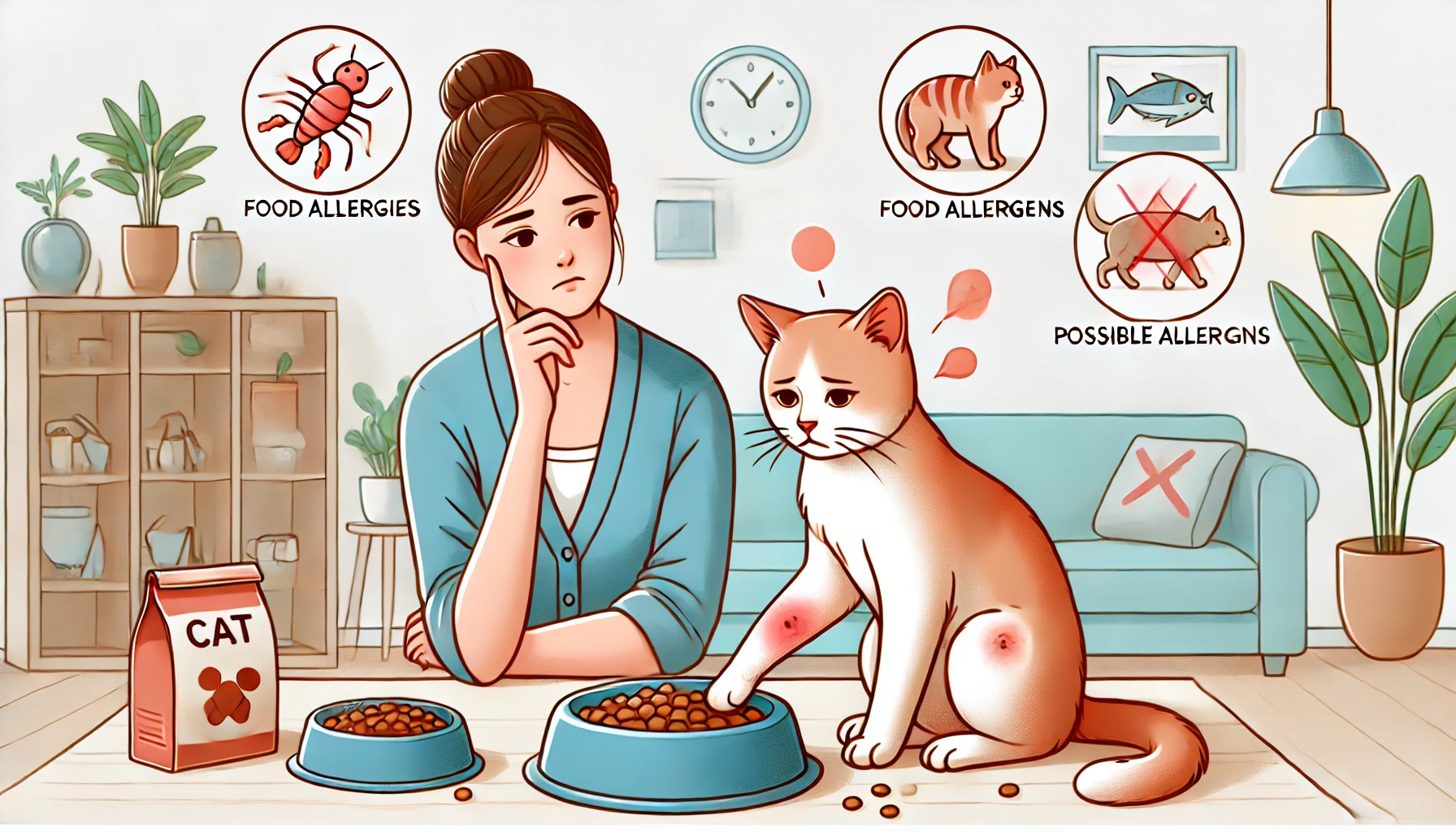
Identifying Food Allergies in Cats
The diagnosis of your cat’s food allergies is where it all begins in managing them.
Common signs associated with food allergies in cats include:
- Itchy skin or excessive scratching.
- Gastrointestinal issues such as vomiting or diarrhea.
- Symptoms of frequent ear infections or head shaking.
- Respiratory difficulty, including wheezing or shortness of breath.
If you notice any of the above signs and symptoms, you should seek the help of your veterinarian for proper diagnosis.
Your vet will likely recommend conducting a food trial using a specialty allergy diet for cats to identify which food allergen your cat is reacting to.
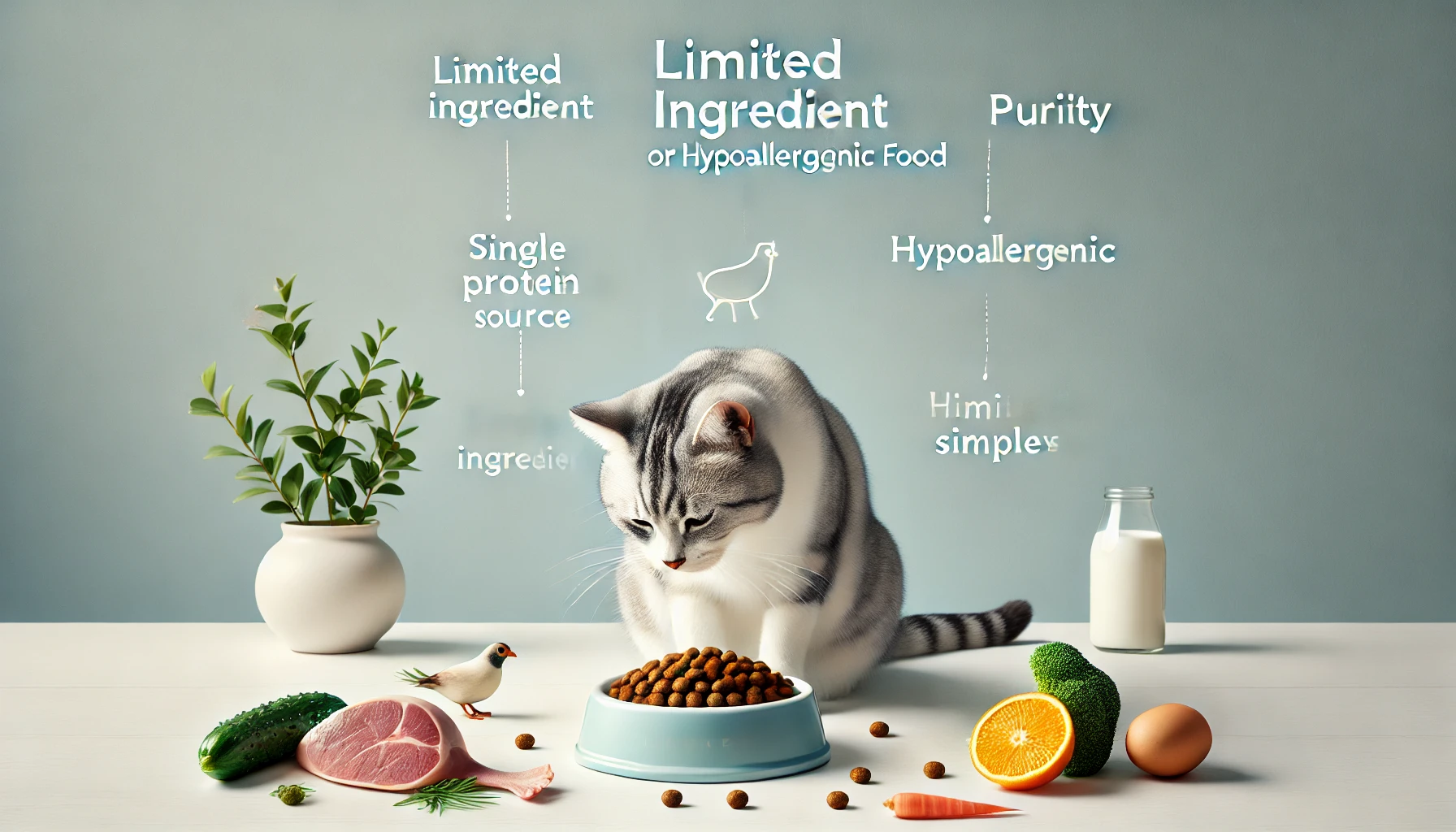
Limited Ingredient and Hypoallergenic Diets
Also referred to as a limited ingredient diet for cats, this diet focuses on the use of fewer ingredients to minimize the risk of an allergic reaction.
Most of these specialty diets for cats include a single source of protein and a single carbohydrate source, making it easier to eliminate the allergen causing your cat’s symptoms.
Another option is a hypoallergenic diet for cats that uses hydrolyzed proteins.
These proteins are broken down into smaller components, which offer less chance of triggering an immune response in your cat’s body.
Such diets are best suited for cats with severe food allergies, where standard proteins, even in a limited ingredient formula, cause discomfort.
Important Note on Switching to an Allergy Diet
- Always consult your vet before switching your cat to a specialty allergy diet.
- Switch to the new diet gradually to prevent digestive upset.
- Monitor your cat’s symptoms closely as you transition to the new diet.
The right specialty diet for cat allergies can help relieve some of your cat’s symptoms, improve their quality of life, and ensure they get the right nutrients without suffering from allergic reactions.
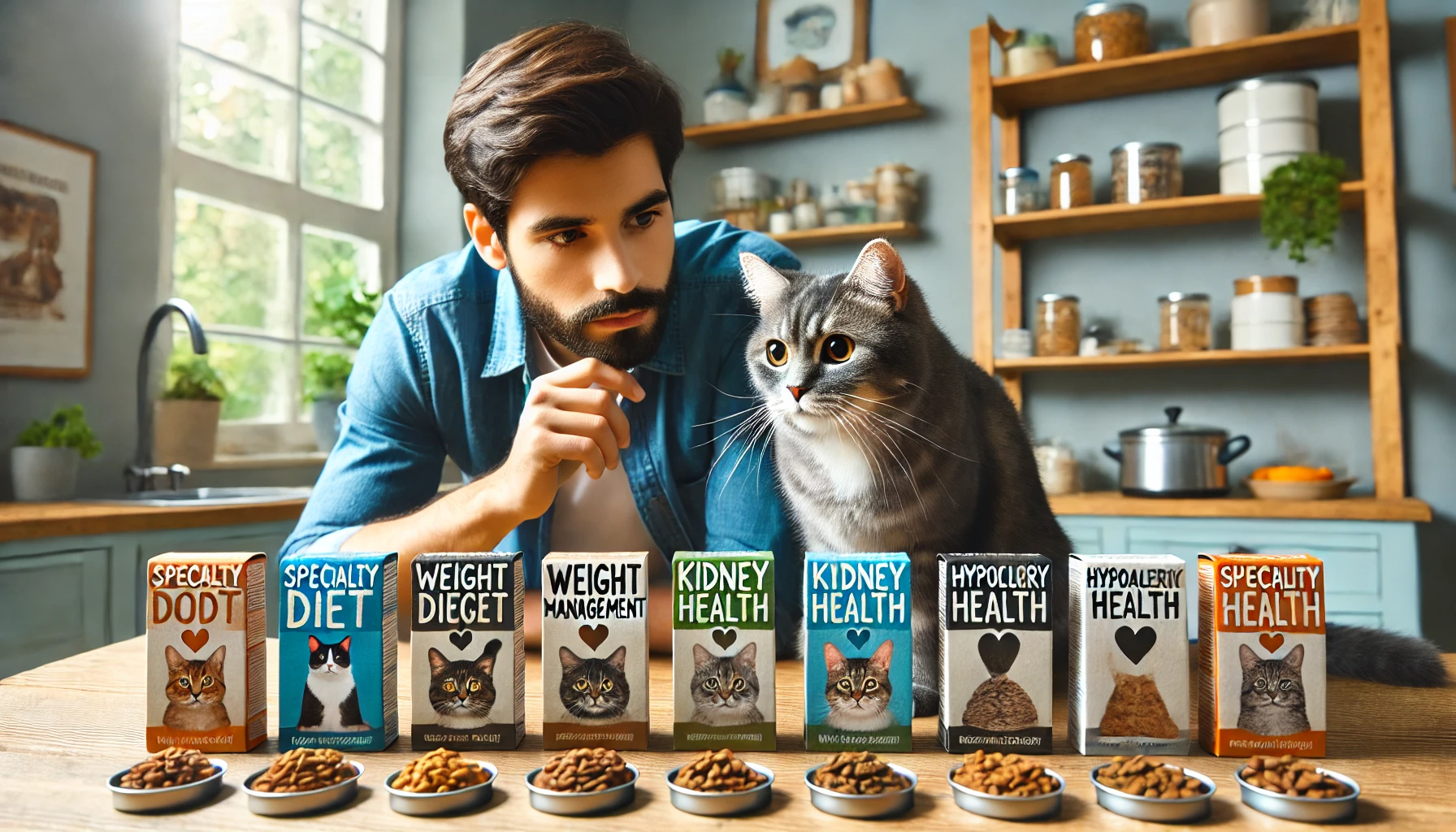
Choosing the Right Specialty Diet for Your Cat
Picking the best specialty diet for your cat means thinking about their specific health needs and how the diet will address those requirements.
Felines are unique, so what their bodies require will vary depending on factors like age, weight, activity level, or the presence of underlying health conditions.
Choosing the right specialty diet for cats requires careful consideration and should include consultation with a veterinarian to ensure the proper feeding plan for your feline.
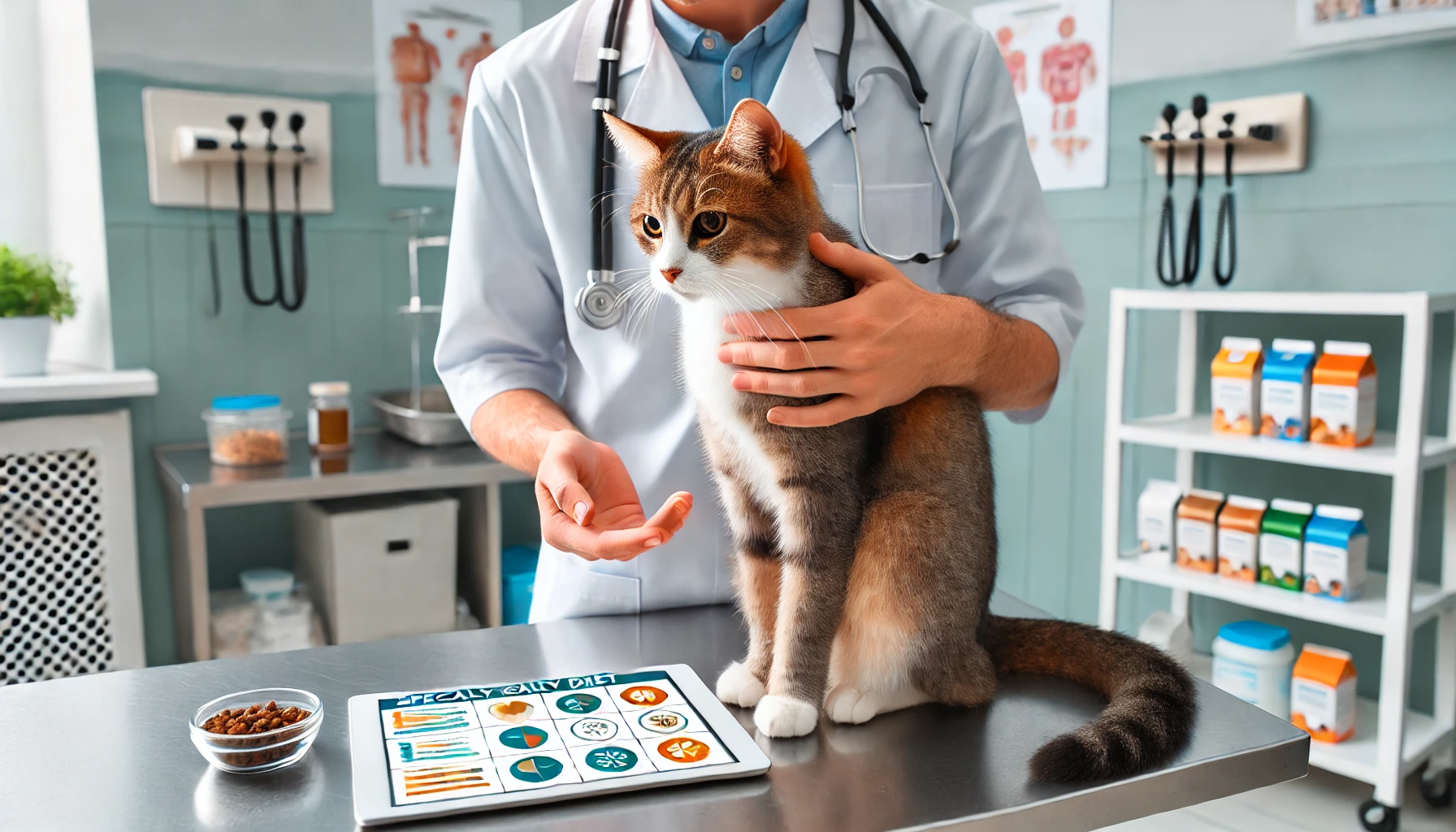
Consulting with Your Veterinarian
The initial step to picking the right specialty diet for cats is to consult with your veterinarian.
A vet not only examines your cat’s health but also diagnoses any conditions and will recommend the best diet for their specific needs.
Whether your cat is dealing with weight management issues, requires specialty diabetic cat food, or needs a kidney diet for cats, your veterinarian will help point you in the right direction.
Working closely with your vet is essential because they can also monitor your cat’s progress, adjust the diet as needed, and ensure that your chosen specialty diet is improving your cat’s overall well-being.
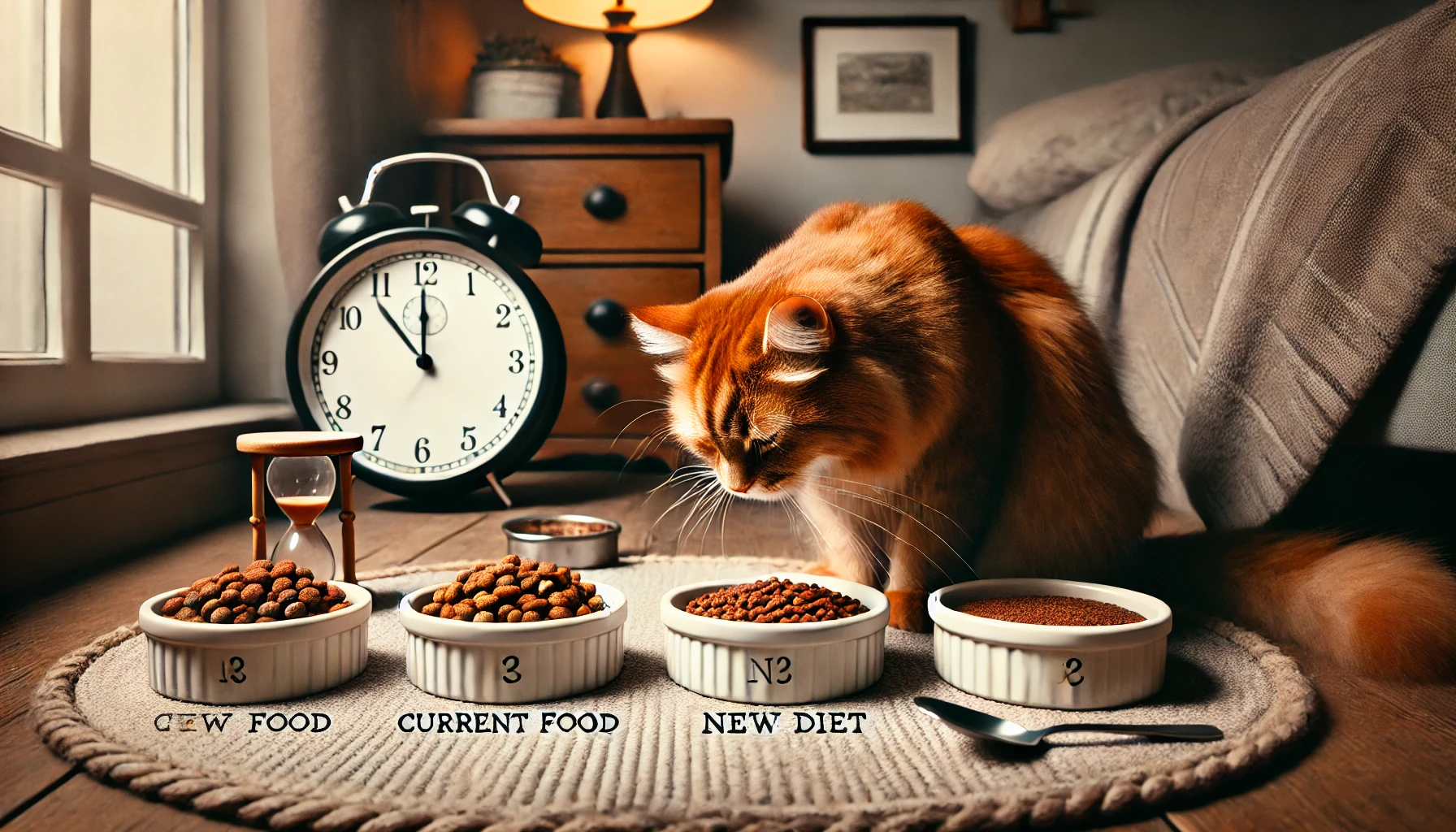
Transitioning to a New Diet Safely
Any transition to a new specialty diet for cats should be gradual to prevent gastrointestinal upset.
Cats can be very sensitive to changes in their food, so it is important to slowly introduce the new diet.
Start by mixing a small amount of the new food with their current diet, then gradually increase the amount of the new food over 7-10 days.
This gradual transition will help avoid upsetting your cat’s stomach and allows their digestion to adjust to the new ingredients as intended.
Additionally, this gives you the chance to monitor how well your cat is responding to the new diet and ensures they will eat the food consistently.
In some cases, your veterinarian may recommend a specific feeding schedule or portion sizes to help with the transition, especially if your cat is switching to a specialty weight management diet or a diet for diabetic cats.
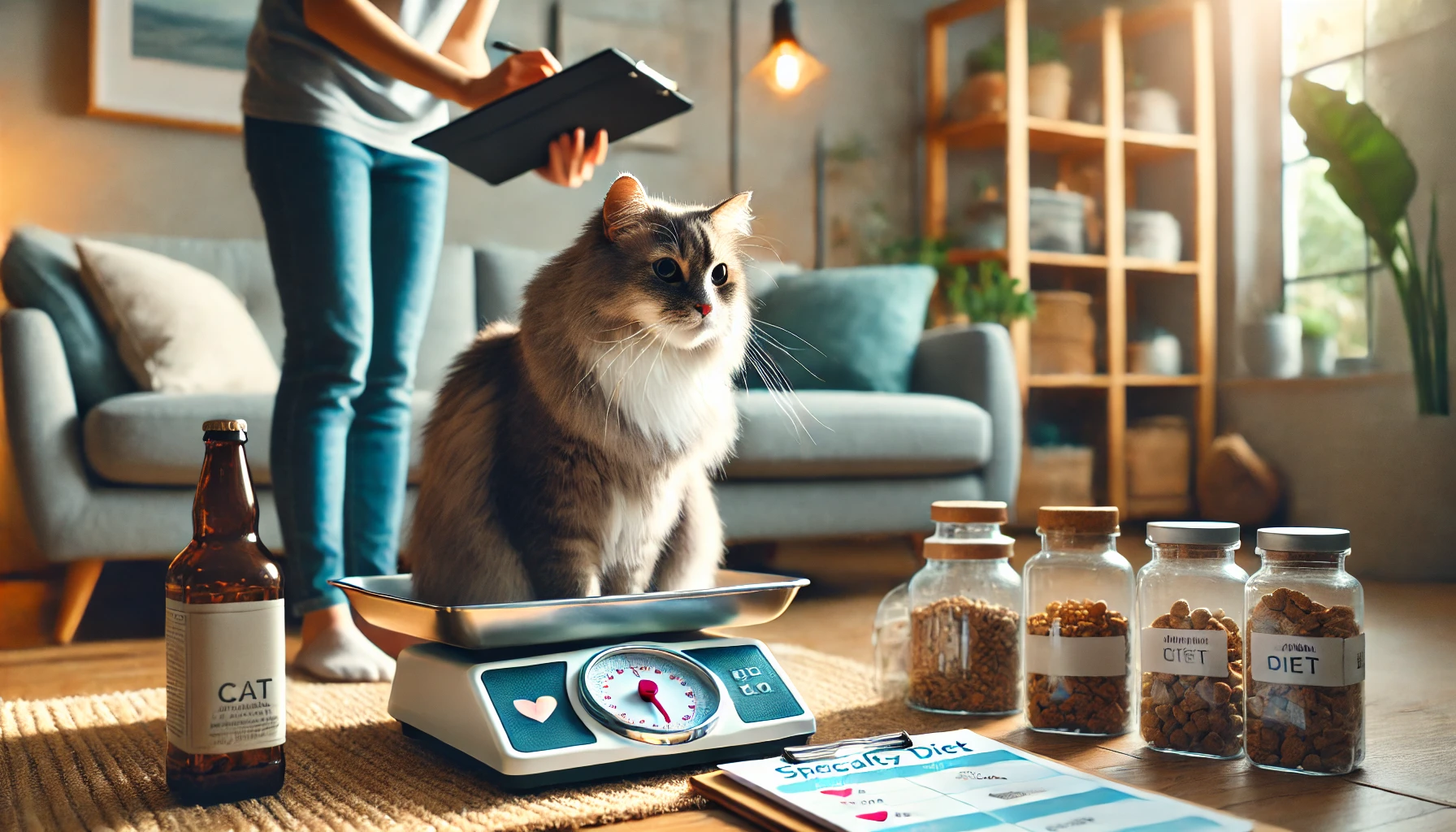
Monitoring Your Cat’s Health on a Specialty Diet
As your cat transitions to a specialty diet, their overall health condition should be monitored regularly.
Pay attention to changes in behavior, energy levels, coat condition, and physical appearance.
Regular follow-up visits to your veterinarian are also crucial for monitoring the effectiveness of the diet and making adjustments as necessary.
Tips for Monitoring Your Cat’s Health
- Weigh your cat regularly, especially if they are on a specialty diet for weight management.
- Observe your cat’s energy levels and overall behavior.
- Monitor any changes in coat condition or skin health.
- Follow up with your vet at regular intervals to check on the progress of the diet.
By staying observant of your cat’s health and collaborating with your vet, you can ensure that your feline is thriving on their specialty diet and living a healthier, happier life.
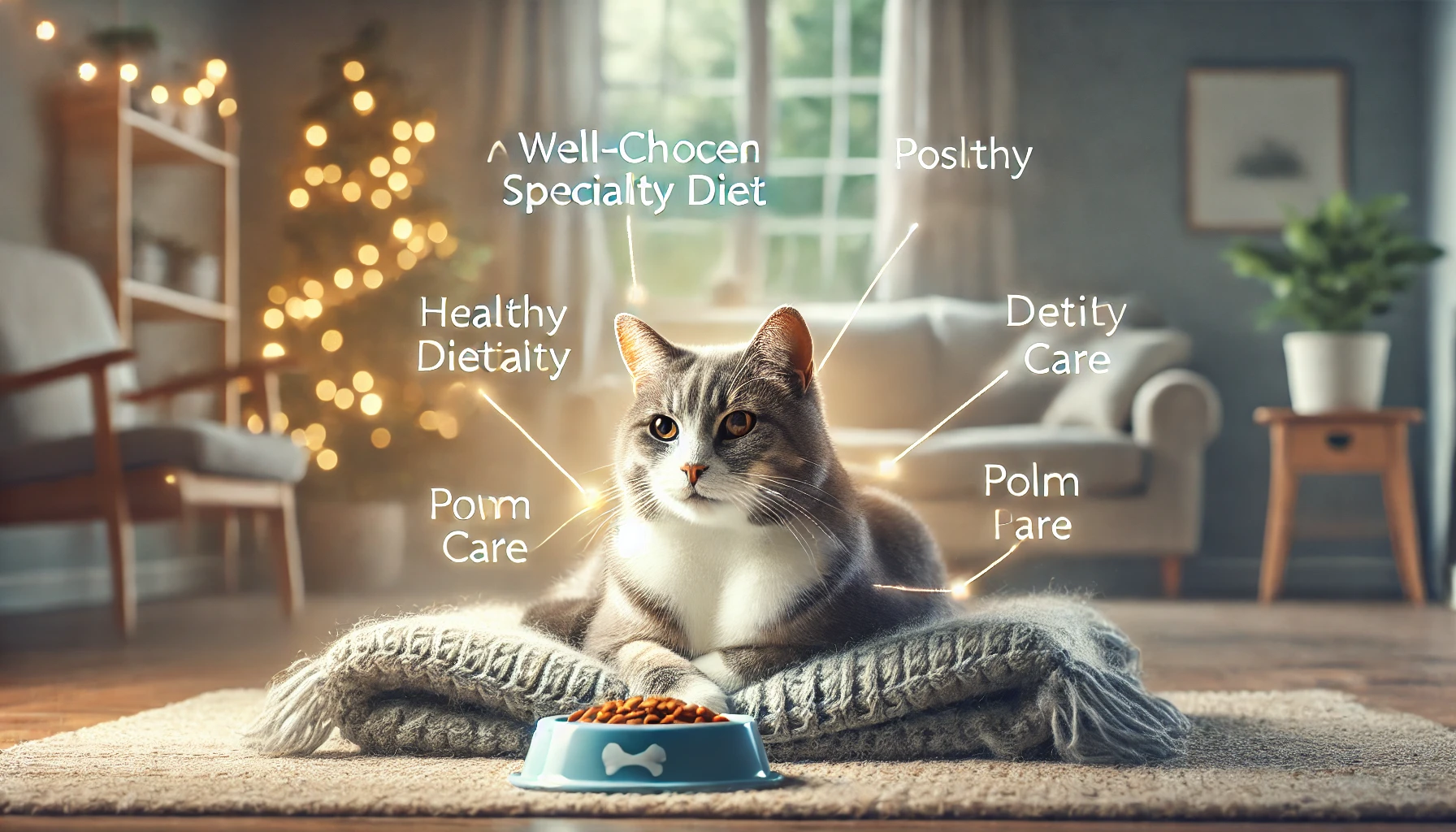
Final Thoughts on Specialty Diets for Cats
To the extent that your feline’s prosperity goes, an exceptionally balanced diet is everything.
With specialty diets for cats, there comes a wide variety of options that can be very helpful in meeting specific health needs through precise nutrition that may help manage chronic conditions, and in some cases, alleviate them.
Whether it is a dietary plan for weight management, diabetes, kidney issues, or allergies, selecting the appropriate specialty diet for your cat will go a long way in enhancing the quality of life for your feline companion.
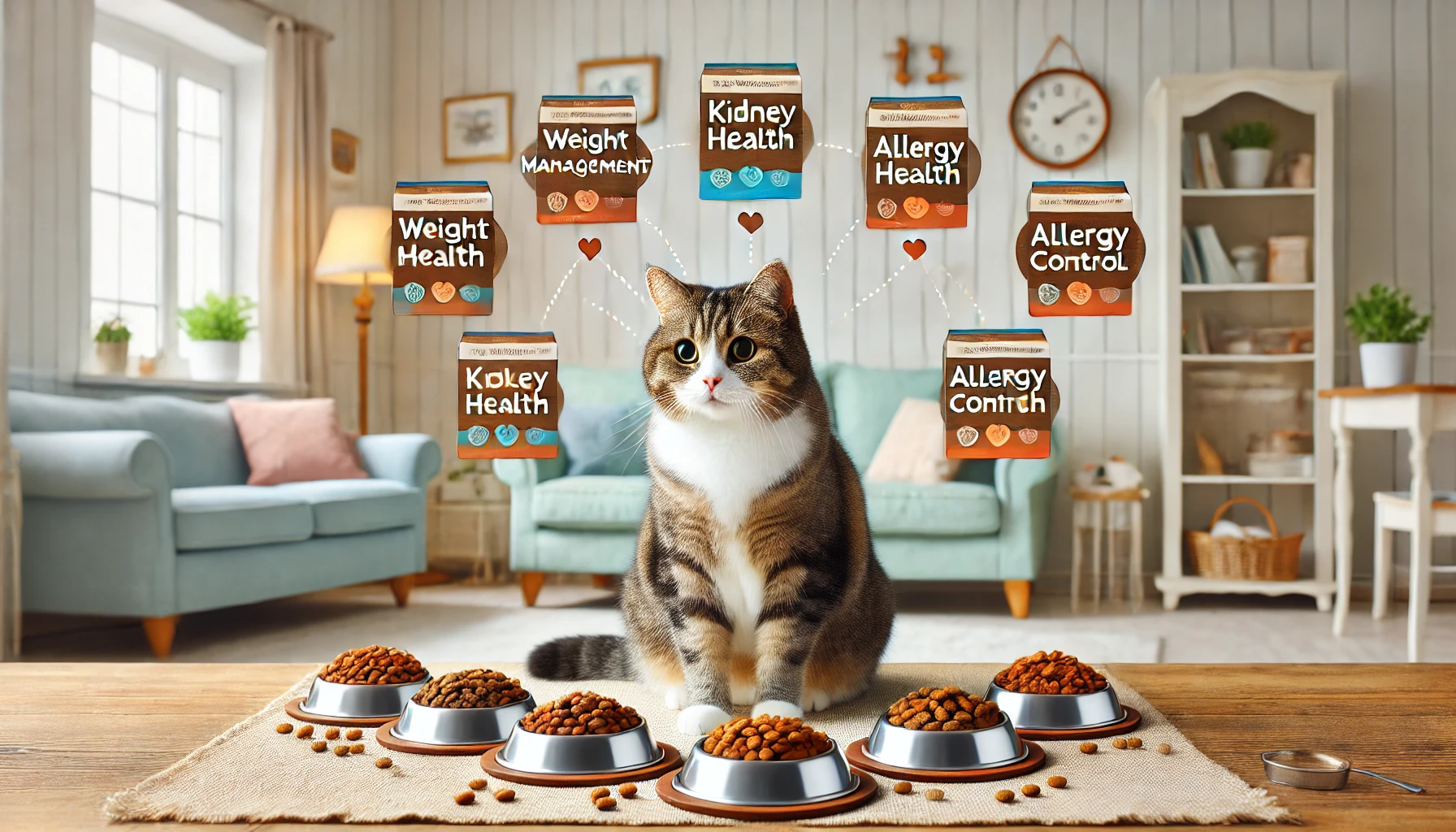
The Importance of a Tailored Approach
No two felines are identical, nor are their dietary needs.
There definitely can’t be a one-size-fits-all approach to cat nutrition, especially in the presence of specific health concerns.
Specialty diets for cats take a customized approach to nutrition, ensuring that your cat gets exactly what they need.
This is essential for them to thrive while managing their unique conditions.
From low-protein diets supporting kidney function to novel proteins added for food allergies, these diets address their individual needs.
You should work closely with your veterinarian to choose the best specialty diet for cats tailored to your cat’s needs.
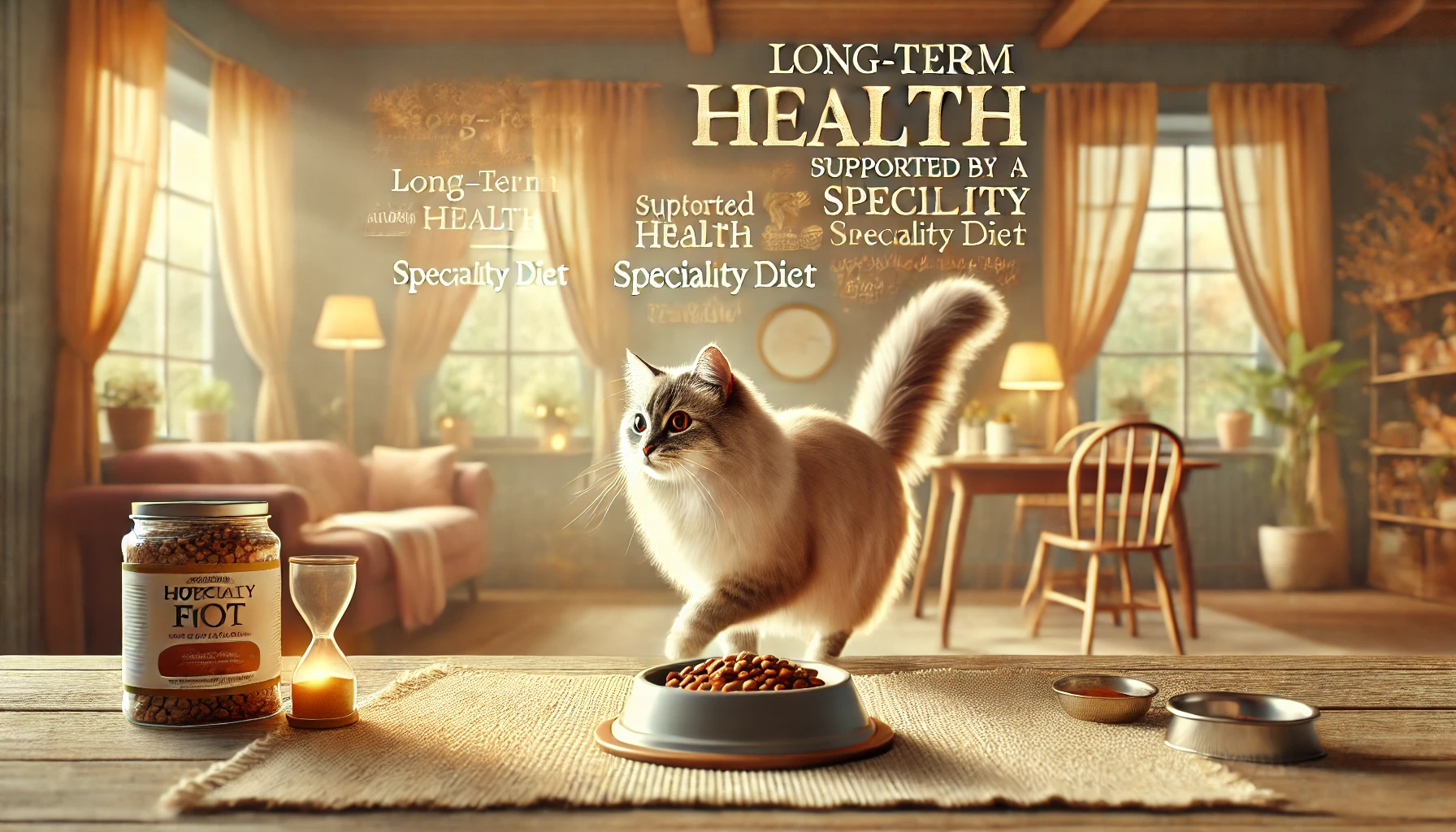
How Specialty Diets Support Long-Term Health
Specialty diets for cats are not solely for treating present health issues; they are also for fostering long-term well-being.
These diets help prevent the progression of chronic diseases, promote vitality, and provide the right nutrient balance.
Cats fed with specialty diets often show improved energy, healthier skin and coat, better digestion, and an overall enhanced quality of life.
- Weight management diets are associated with steady and healthy weight loss and prevent complications of obesity.
- Kidney health diets for cats ease the strain on the kidneys and slow the progression of the disease.
- Properly maintained diabetic diets for cats regulate blood glucose levels and reduce the need for insulin in the body.
- Allergy diets minimize adverse reactions by eliminating common allergens.
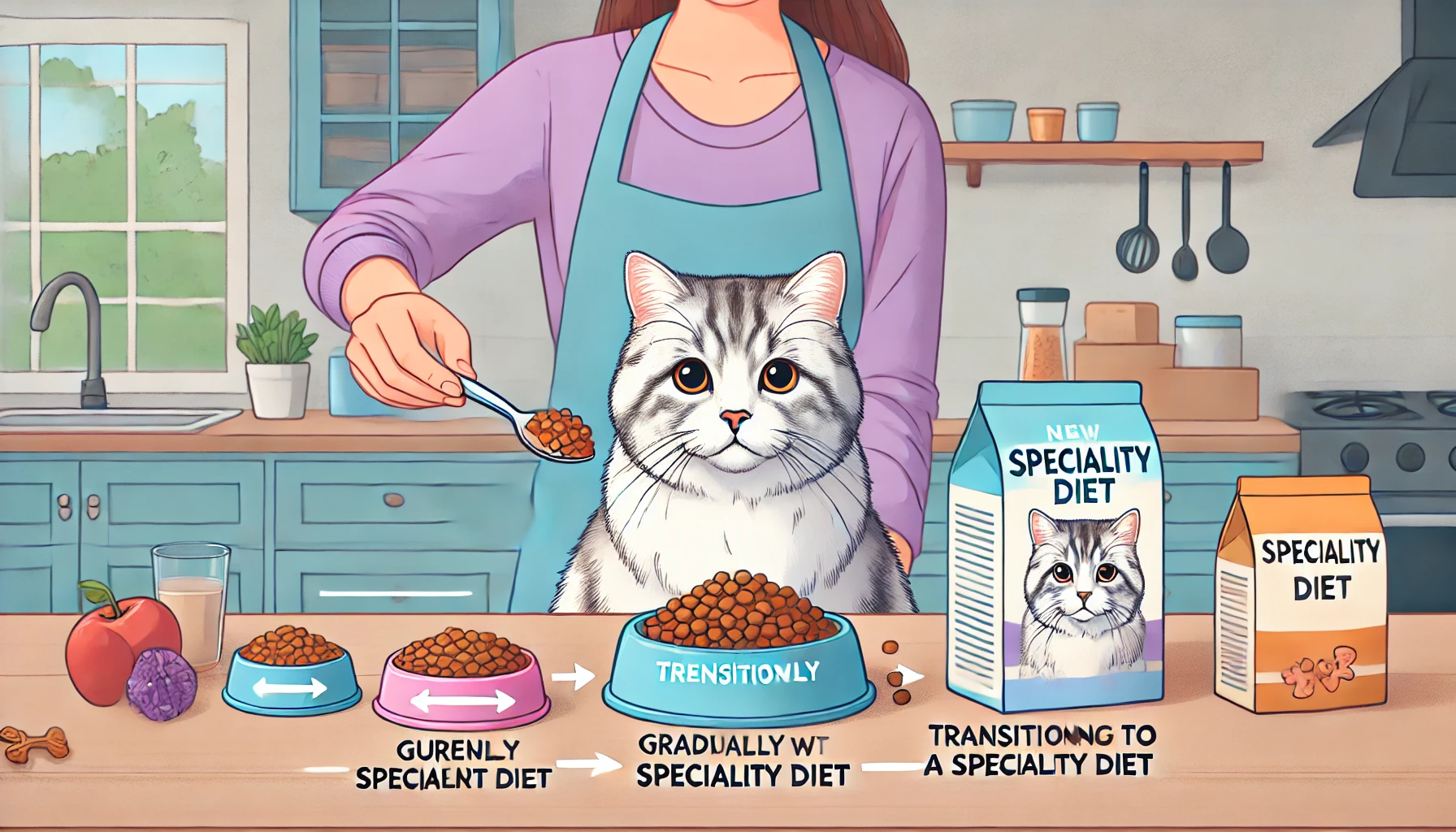
Choosing and Transitioning to a Specialty Diet
Choosing the right specialty diet for cats and introducing your cat to that food should be done gradually.
Consulting with your vet will ensure it’s the right diet that caters to the specific needs of your feline friend.
A gradual transition over 7-10 days allows for adjustment without digestive upset and provides your cat with a comfortable acclimation to their new food.
Monitoring the health status of your transitioning cat is therefore essential.
Weight, behavioral changes, and coat condition should be tracked alongside regular check-ups to assess the effectiveness of the diet.
This greatly ensures the well-being of your cat on their new specialty diet.
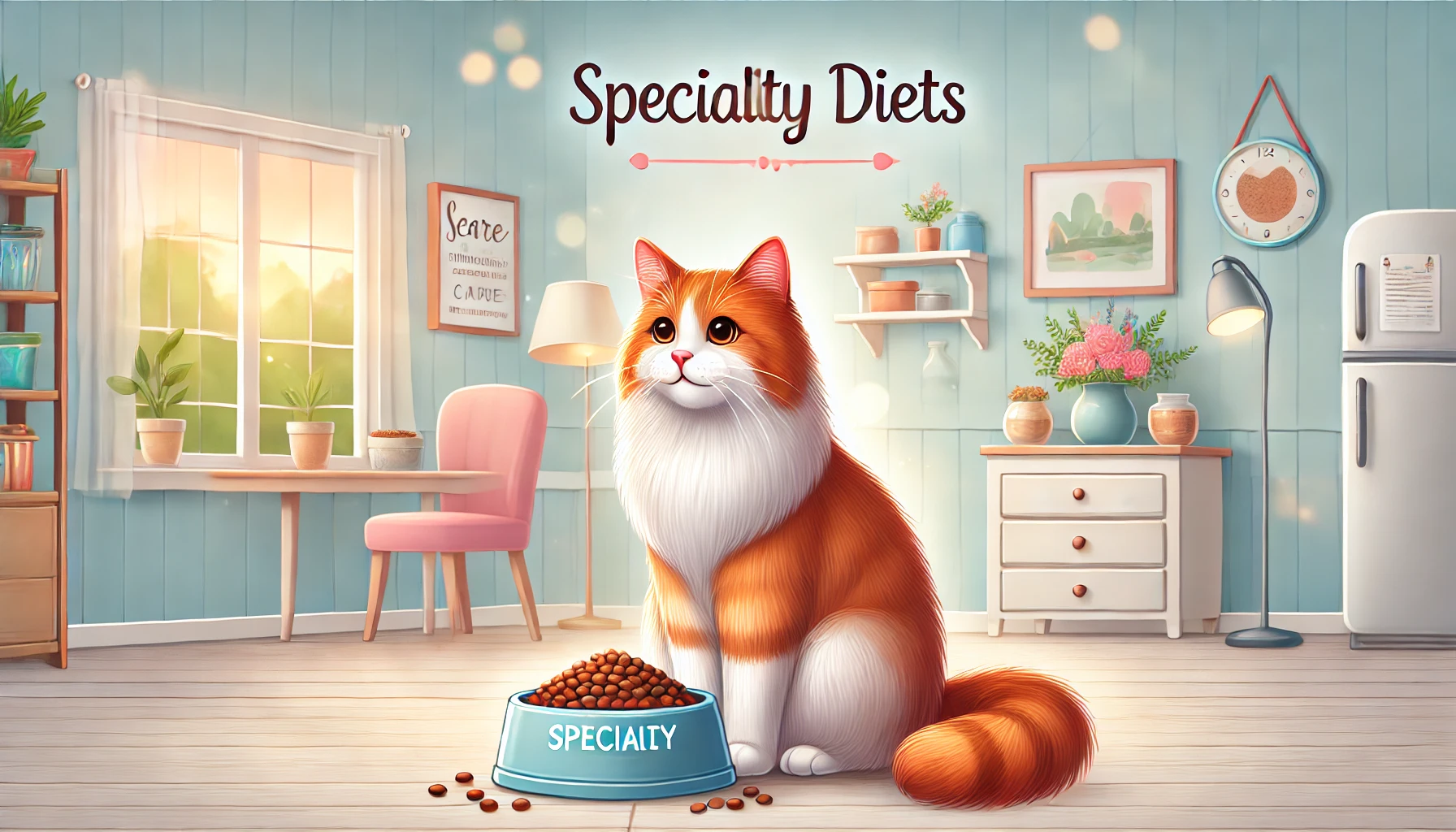
In Summary: The Benefits of Specialty Diets for Cats
By putting your cat on a specialty diet, you’re not just treating some of the short-term health concerns; you’re paving the way for a healthier, happier future.
These diets are specifically designed to meet the unique needs of cats with conditions like kidney disease or allergies, and they provide the balanced nutrition necessary for their long-term health.
The right specialty diet for your cat will ensure improved well-being and increased energy, leading to a better quality of life.
Consult with your vet, transition carefully, and monitor progress for the best possible outcome for your cat.
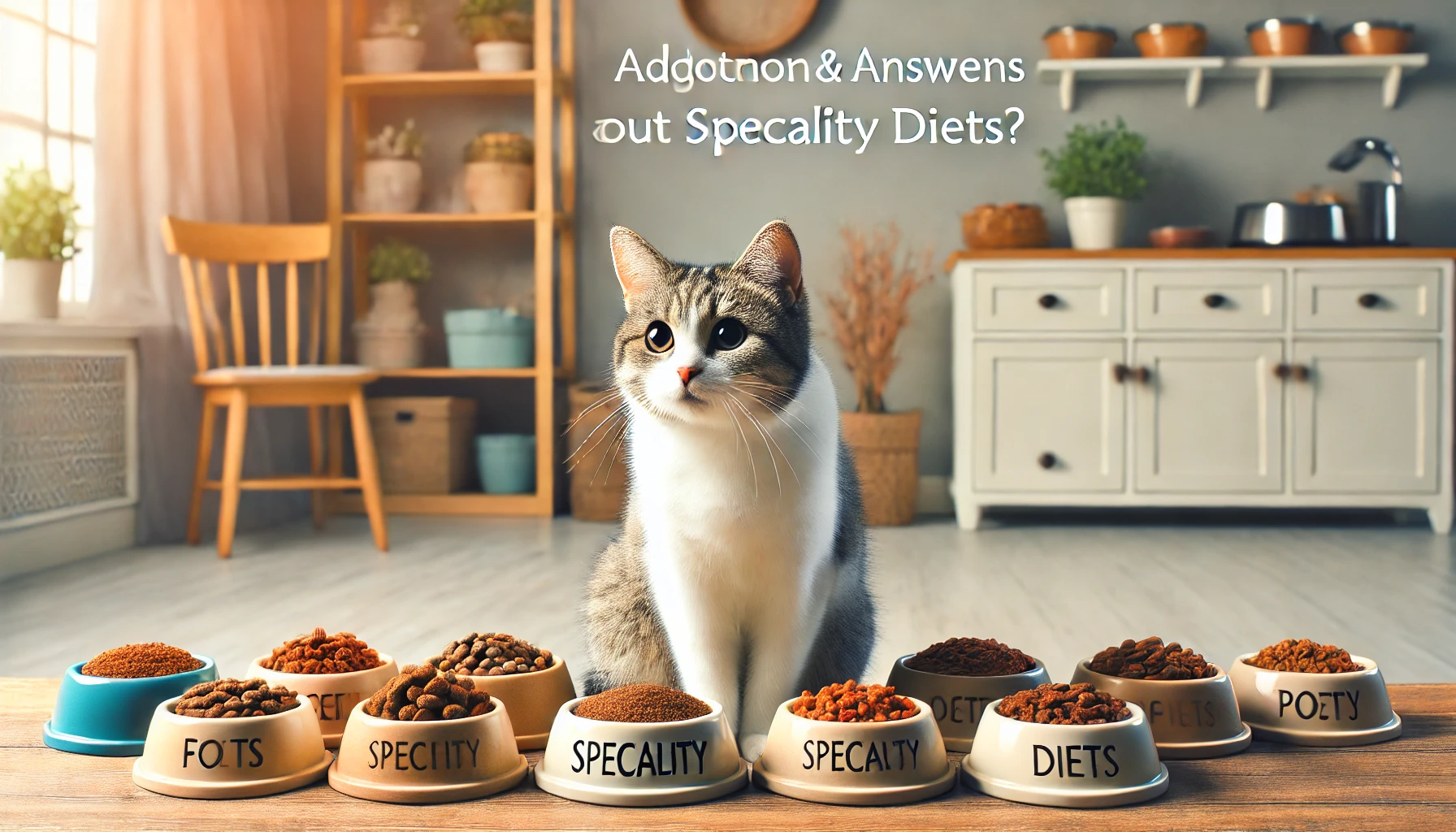
Frequently Asked Questions about Specialty Diets for Cats
What are specialty diets for cats?
Specialty feline diets address specially formulated diet plans that help manage cats with specific needs, ranging from weight management and chronic kidney diseases to diabetes and food allergies.
How do I know if my cat needs a specialty diet?
Your vet may recommend specialty diets for cats if your cat is suffering from chronic conditions, such as diabetes, kidney diseases, or allergies.
Can I switch my cat’s food to a specialty diet suddenly?
No, a change to specialty diets for cats must be gradual—like 7-10 days—to avoid digestive upset and give your cat time to adjust to the new food.
What is the best diet for a diabetic cat?
Specialty diets for diabetic cats that are low in carbohydrates and high in quality protein help regulate blood sugar levels.
Are prescription diets necessary for cats with kidney disease?
Yes, prescription kidney diets for cats are formulated to reduce protein and phosphorus levels, which in turn will slow the progression of the disease and support kidney function.
Is wet or dry food better for cats on a specialty diet?
A specialty diet for cats can consist of both wet and dry foods.
Wet food provides better hydration, while dry food may be beneficial for dental health.
Your vet will advise on the best options.

